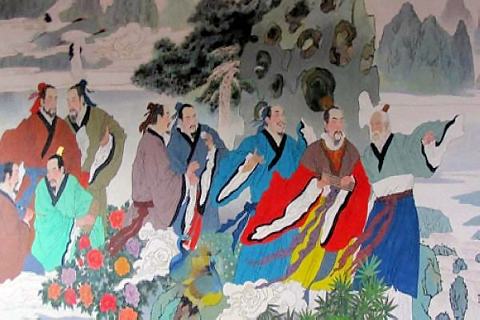
Content created: 2014-04-09
File last modified:

LIÚ Ān 刘安 was the grandson of the founding Hàn emperor (Hàn Gāo zǔ 汉高祖, reign 6b-1, 206-195 BC) and, as a royal descendant, was made the suzerain of a domain called Huáinán 淮南 north of the Yangtze River and south of the Huái 淮 River. (Indeed, the name Huáinán literally means "south of the Huái.") It was located more or less in what is today Ānhuī 安徽 province. His title was wáng 王, which often means king, but in dynastic times is better rendered "prince."
Liú Ān was apparently extremely interested in alchemy and in legends of a possible elixir of life, and he became the patron of scholars and artists, including, tradition tells us, a group of eight Daoist "miracle-workers" (not the same as the famous "eight immortals"!). The eight miracle-workers' discussions were written up by an anonymous scribe and constitute a text called "The Masters of Huáinán" (Huáinán Zǐ 淮南子). The work includes a mix of observations on government and on nature (including, of course, alchemy). It eventually came to be a canonical text of considerable importance in religious Daoism.

After Liú Ān's death in 122 BC, the political correctness of Confucian orthodoxy came to prevail, memories grew dim of the famous masters of Huáinán, and their text faded into comparative obscurity, at least among the Confucian elites. (Click here for scandalous gossip concerning his death.)
Singular and plural are not routinely indicated in Chinese, and in later times the masters came to be thought of as singular. That is, the name "Huáinán zǐ," or "Masters of Huáinán," was misunderstood to mean "the sage named Huáinán." In fact "he" was credited with the invention of bean curd and even today is regarded by some as the patron god of bean curd sellers.
The present tiny fragment of the famous book is representative of much of Chinese writing about warfare, especially by Daoist writers. Not only is the hero a humble man —in this case even a thief— but the strategy he employs has the very Daoist subtlty of achieving one's goals by letting nature take its own course. (Different editions of the Chinese text have occasional minor textual variations. I have chosen what strikes me as the "cleanest" one, but the differences do not affect the meaning.)
Click here for more about Daoist writings.